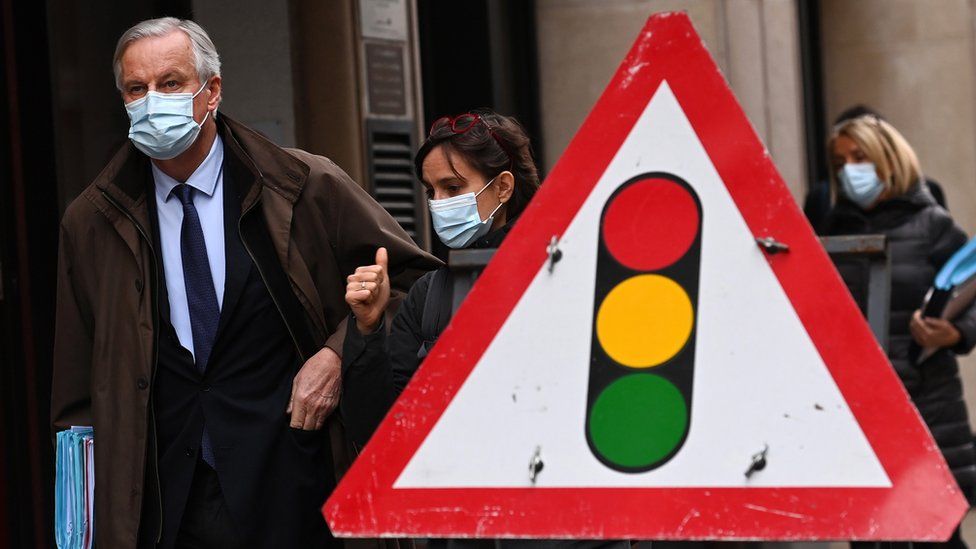Brexit: Are both sides running out of road to make a deal?
- Published

These are unsettling days for those of us watching, waiting and occasionally nail-nibbling, constantly calling sources, perpetually checking social media, for hints that an EU-UK trade security deal is nigh - or off the table completely this year.
News could come at any moment.
The EU - infamously talented at the old goalpost-moving - has admitted that not only does the European Parliament not need to ratify an agreement for it to be provisionally applied as of 1 January, but that EU leaders don't even need to sign off on the treaty in person. An approved member of their government could do that instead, from the comfort of their own home.
Could a deal come between Christmas and New Year, then, is the horrified question in EU capitals.
Boris Johnson doesn't seem in a hurry to make up his mind, is the broad sentiment in Brussels. EU leaders don't view the prime minister as a details man.
They don't think he's waiting to hear about the finer points of mackerel, herring or cod quotas before deciding what is politically more expedient for him. Declare a firm resolve and no deal and face the music from the opposition and many UK businesses? Or compromise to get a deal and be accused by ardent Brexit supporters of "betraying the Leave vote"?
As always, the EU is only too happy to point out that there's no win-win here. The prime minister can't have his Brexit cake and eat it.
Key issues remain the same
For now, though, we're told there's little movement in talks, even though Belgium's prime minister noted the two sides "are in the last minutes of a football match".
Michel Barnier the EU's chief negotiator, was reportedly in good spirits when he reported on the negotiations to representatives of the 27 EU countries on Wednesday morning. But he emphasised that the key outstanding issues remained very much the same:
- EU fishing rights in UK waters after Brexit
- Mutually agreed competition rules
- And how to govern a deal, including managing any arising disputes if either the UK or the EU failed to keep to the agreement
BBC Reality Check explains why the level playing field matters in Brexit talks
"This is the painful part," one EU diplomat told me, meaning that it's now time for difficult concessions. But frankly this has been the case for weeks. And as far as I and other observers can make out, both the EU and UK are still busy looking into the whites of each other's eyes, rather than holding their nose and jumping.
EU diplomats insisted on Wednesday that the EU had gone pretty much as far as it could.
"Michel Barnier didn't ask us today for more flexibility in his negotiating mandate," one source told me. "If he had, our answer would have been clear."
No EU possibility to compromise at all any more, I asked. "Only millimetres," came the reply.
Of course, the EU would say that. It wants the UK to make the big concessions. For a while now, EU countries - particularly those geographically closest to the UK, like France, Belgium and the Netherlands, have been nervous that Mr Barnier might concede "too much" in these negotiations.
There's little appetite in the EU of wanting to do "whatever it takes" to get a deal. At five minutes to midnight, or otherwise.
Angela Merkel noted that some EU countries were becoming impatient. France's Emmanuel Macron insisted on Tuesday that France would not sign up to anything that wasn't in its long-term interest.
But, of course, the UK government says the same.
Why leave the EU if only to tie yourself a few months later to Brussels' regulatory apron strings? Why break free from EU rules, with the dream of becoming a nimbler, more competitive sovereign economy, if you're then constrained by an EU trade deal in how much the government can invest in UK industries?
And there, it seems, we are still stuck - provoking anxiety in businesses both sides of the Channel.
The government and the European Commission insist companies were given plenty of warning. Whether a deal is agreed or not by the year's end, with the UK leaving the single market and customs union, big changes lie ahead.
Yet the details of the deal are important for business.
And a no-deal situation would probably further complicate and/or delay a decision on other impactful issues, separate from these negotiations. Like UK financial services' access to the Single Market after Brexit, or the flow of data between the EU and UK.
As for people's holiday plans, there's pet travel permissions and EU and UK access to each other's healthcare systems still to sort out.
EU countries are trying to pile pressure on a reluctant European Commission to be more open about contingency measures in case there's no deal - for example on transport, air traffic control and aviation safety. But Brussels doesn't want to give the UK the impression that it can benefit from a series of "mini deals" without signing up to a mutually agreed treaty.
After months of these circular negotiations on the same sticking points, EU attention is now re-focusing on Brexit - with a sense of weary resignation and tension.
"It's still feasible that we'll get a deal this month," one contact told me. "Or it could be next month. Or next year."
If that's the case, both sides admit, the road will be bumpy and costly from 1 January, at least in the short to medium term.
- Published28 January 2021